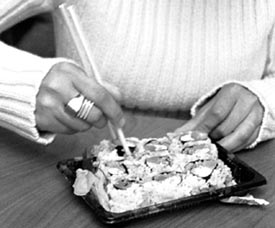When people hear the word “sushi” they are either repulsed or suddenly ravenous with hunger.
Plenty of people can keep their love for sushi under control, but there are quite a few who believe they are truly addicted to the fishy food.
According to the Human Service Center hotline, there are no known addictions linked to sushi. The operator, name withheld, had never even heard of such a thing.
“That’s ridiculous,” she said. “It sounds like these people have a deeper problem than sushi addiction.”
But still, several people claim to have addictions.
Cravings can strike at any moment, and in a real pinch C-Store sushi comes to the rescue.
The C-Store is stocked daily with small packages that fill the refrigerator shelves. The raging sushi addicts who roam Loyola snatch this sushi up for lunch and/or dinner.
Some people like sushi but can’t bring themselves to that level of desperation, which would entail them taking a trip to the Danna Center.
“I really like sushi, and back home I was addicted, but I’ve really been turned off by the C-Store sushi,” said Valerie Bernard, marketing freshman.
Like a crack addict who can’t function without a quick fix, sushi fiends experience similar symptoms. “I seriously shake and cannot concentrate when I have sushi on my mind,” Cate Esser, communications freshman, said. “Sometimes when the cravings are really bad, I resort to the C-Store. It’s not the best, but it holds me over, and I’ll just take what I can get.”
Everyone has his or her own take on this nouveau addiction.
Some say it’s the wasabi that makes it addictive. Wasabi is a bright green paste that is extremely spicy.
Others will argue that the ginger is what makes it addictive. But none of these theories have any hold on hardcore addicts.
“I eat sushi all the time, and I disprove that it’s the wasabi, ginger, or even the soy sauce,” Michelle Clarke, communications freshman, said. “I don’t use any of these things; I think it’s the sushi itself. The more frequently you eat it, the more you crave it.”
A sushi addiction is bittersweet. It is actually very healthy.
The most popular sushi, California rolls, are only 40 calories each.
Also, sushi is very filling, and if you’re rich enough to break away from synthetic crab, the fish can help your body ward of such ailments as heart disease.
On the flip side, this addiction can get very costly. Most sushi in the C-Store costs about $5.
If you eat it every weekday for lunch it could run you about $22 a week.
Whether sushi will become the next big viable addiction, we can’t say.
Still, several people will continue to insist that the infusion of rice and raw fish can send them into utopia with just one bite and keep them coming back for more.

A sushi chef at Tulane prepares the popular dish for eager patrons. The sushi at Tulane can be made fresh upon request. The sushi made at Tulane also is shipped to Loyola’s C-store. (Ann Hermes)

Erin Boland happily lifts a roll of fish, seaweed and rice to her lips. This seemingly disgusting combination is actually a pleasurable addiction for many students. This addictive behavior has been seen more and more on campus since the addition of sushi to the C-store. (Ann Hermes)







